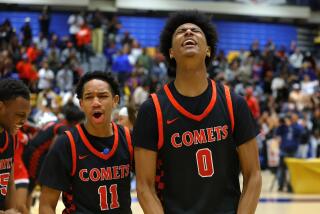Weekend Play Puts Eligibility at Risk
- Share via
The light that splashed on the great, dark secret of City Section soccer last week has players and coaches alike scurrying for cover.
Kennedy was forced to forfeit six boys’ soccer victories because an unnamed player violated a state rule by engaging in “outside competition” by playing for an adult team on weekends.
Clearly this is not an isolated incident.
“You cannot check on the kids, you have to take their word,” said Jose Freire, Birmingham’s coach. “The (adult) teams do everything to let them play. Just about every (high school team) has a player that’s playing outside.”
During their high school season, athletes are forbidden from engaging in competition in the same sport. Outside competition violations are rare in every sport except soccer, officials say.
In most sports, club and youth leagues are scheduled outside of the high school season precisely to avoid conflict. In soccer, however, popular adult leagues play nearly year-around, including during the high school season.
About 500 adult soccer teams currently play in the Valley area, according to the California Soccer Assn., which organizes leagues and keeps track of standings.
“I drive around on Sundays and there are six games going on at Griffith Park and games going on at nearly every park in the Valley,” said Michael Gitomer, the Poly High boys’ coach.
High school students are eligible to play in the adult leagues, which do not ask a player whether he is competing for a school team.
“On Sunday they get to play in front of a lot of people, and the level of competition is much better in the adult leagues,” said Ramon Arceo, a CSA official. “The best age for soccer players is 17 to 20. They are in their prime.
“The rule doesn’t affect adult soccer. The ones who should worry are high school coaches.”
That they do. Most outside-competition violations involve soccer players, according to Barbara Fiege, City Section commissioner. Still, only a handful of violations are reported each year.
“It is up to the high school to get the rule across to athletes,” she said. “I would think that what is happening is that students are choosing to violate the rule in 99% of the cases.”
Most of the violators go undetected. Because coaches can rarely be certain that their own team is clean, they are reluctant to point the finger at others.
“I’ve had kids come up and say they know someone on another team who is playing on an adult team,” Gitomer said. “But I don’t believe in investigating.”
Players don’t often turn one another in, either.
“I know lots of people playing outside, but I’m not the kind of person who’s going to rat on my friends,” said Trevor Schmidt, a senior midfielder at Chatsworth.
Most soccer coaches would like to see the rule abolished so that the threat of forfeiting victories is eliminated.
“We shouldn’t have the right to say what and where kids play on the weekends,” said Chatsworth Coach John McLean.
*
The Southern Section is considering loosening the “outside competition” rule to allow athletes to compete in hybrids of their high school sport.
Currently, during their high school seasons, a football player is prohibited from playing in a flag football league, a softball player cannot play on a slo-pitch team, and a volleyball player can’t compete in two-person beach volleyball.
“The rule is under scrutiny, it has been a discussion item,” said Bill Clark, a Southern Section administrator.
The protests of soccer coaches notwithstanding, most coaches are proponents of the rule because it gives them more control over their athletes during non-school hours.
“Kids who are playing a sport all week long need a rest on the weekend,” said one high school coach. “They have a hard time saying no to a club coach, to any coach.”
*
As Ronald Patterson of Grant prepared to take a 50-foot shot during a practice at lunch Friday, he jokingly told his brother Donald that if the shot went in, Donald couldn’t play basketball next year. The shot missed badly and the antic was forgotten when the bell rang for class.
That evening in a first-round playoff game, Ronald tried a 50-foot shot one second before the final buzzer. This time it banked in, giving Grant a 58-55 victory over Locke.
“The shot he made was taken from exactly the same spot as the one he missed at lunch,” Coach Howard Levine said.
Shots like that can cause a team to believe in divine intervention. The last time a Grant player made a 50-footer at the buzzer, the team went on a tear and advanced to the City Section final. The shot came in 1988, when Sean Watkins beat Monroe at midseason.
Somebody was on Grant’s side during the final minute Friday. Locke held the ball for about 40 seconds before a player missed an open 10-footer with 15 seconds to play. After a scramble for the ball, another Locke player missed a layup with eight seconds to play.
Grant’s Taj Rollins grabbed the rebound and passed to Patterson, who took three dribbles before launching his game-winner.
*
Add intervention: After the game, the Grant players bowed their heads and thought of Chi Chen, a teammate from 1991-94 who died in an auto accident Feb. 7.
“We feel that he was sitting on Ronald’s shot and rode it home,” Levine said. “We do acknowledge the fact that he is with us.”
* Contributing: Tris Wykes.
More to Read
Get our high school sports newsletter
Prep Rally is devoted to the SoCal high school sports experience, bringing you scores, stories and a behind-the-scenes look at what makes prep sports so popular.
You may occasionally receive promotional content from the Los Angeles Times.







